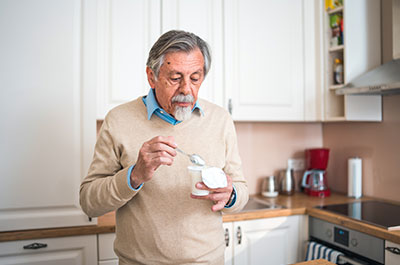While 99% of breast cancers are diagnosed in women—and 1% are diagnosed in men—breast cancer is the most common type of cancer, with lung cancer trailing behind as the second most common type of cancer.
“One in eight women will be diagnosed breast cancer,” says Theresa Schwartz, M.D., a breast cancer surgeon with Henry Ford Health. “As the population grows, so does the rate of breast cancer. We don’t, however, have any scientific evidence explaining why breast cancer is more common than other types of cancers.”
While breast cancer is more common than lung cancer, lung cancer is more deadly than breast cancer. Incidences of death from breast cancer have been decreasing, likely thanks to increased awareness about breast cancer, earlier screenings and more effective treatments. According to the American Cancer Society, from 2013 to 2018, the death rate decreased by 1% per year.
While there’s much we don’t know about why breast cancer is so prevalent, we do know important risk factors. “Being a woman and getting older, since the majority of breast cancers are diagnosed in women over the age of 50, increase the risk of breast cancer development,” says Dr. Schwartz. “After that, the biggest risk factor relates to your family history. Having a first-degree relative with breast cancer, like a mother or sister, puts you at higher risk. Although not frequently seen, having a genetic mutation, such as carrying the BRCA1 or BRCA2 gene, two genes linked to breast cancer, also puts you at higher risk.”
These risk factors are important to be aware of so that you can talk to your doctor and ensure you are undergoing appropriate breast cancer screenings.
Breast Cancer Risk Factors That You Can Control
While the above factors are out of your control, there are also certain risk factors for breast cancer that you can control:
- Body fat. Women who are overweight or obese have a higher risk of developing breast cancer than women who are at a healthy weight. But it doesn’t just come down to the number on the scale. Ensuring that you having less body fat and more muscle is what will help decrease your risk of breast cancer.
- Alcohol intake. “We recommend an average of no more than one alcoholic drink per day,” says Dr. Schwartz. “Consuming more than this increases your risk of breast cancer.”
- Tobacco use. “Tobacco has no health benefits, only risks,” says Dr. Schwartz. “When it comes to breast cancer—or any cancer—there’s no safe amount of tobacco. I always recommend complete cessation of all tobacco, including vaping.”
- Combination hormone therapy. Combination hormone therapy (or estrogen plus progesterone) increases someone’s breast cancer risk. “I recommend minimizing the use of combination hormone therapy as much as possible,” says Dr. Schwartz. “Complete cessation is the most effective.”
Lastly, as always, diet and exercise are important factors in reducing your risk for breast cancer, as well as many other diseases. “Get your heart pumping regularly, get enough sleep, and eat plenty of fresh fruits and vegetables,” says Dr. Schwartz. “These are some of the most important investments you can make in your health.”
To learn more about your own risk factors, take our Breast Cancer Risk Assessment quiz at henryford.com/breastcancerrisk.
To make an appointment with a cancer specialist, visit henryford.com/cancer or call 1-888-777-4167.
Dr. Theresa Schwartz, M.D., is a breast cancer surgeon with Henry Ford Health. She sees patients at Henry Ford West Bloomfield Hospital and Henry Ford Wyandotte Hospital.



